The Blessed
Sacrament or the
Works and ways of God
Frederick William
Faber, D.D.
| Nihil Obstat: | JOSEPH A. M. QUIGLEY |
Censor Librorum |
| Imprimatur: |  J. F. O'HARA, C.S.C. J. F. O'HARA, C.S.C. |
| Archiepiscopus Philadelphiensis |
Feast of the Nativity of the Blessed Virgin Mary, 1958
Originally published by the John Murphy Co., Baltimore Maryland. This edition originally published in 1958 by The Peter Reilly Co., Philadelphia.
Library of Congress Catalog Card Number: 78-66302
TAN Books
Charlotte, North Carolina
www.TANBooks.com
1978
TO
My Most Dear Father ,
JOHN HENRY NEWMAN,
TO WHOM
IN THE MERCY OF GOD
I OWE
THE FAITH OF THE CHURCH,
THE GRACE OF THE SACRAMENTS,
AND
THE HABIT OF SAINT PHILIP
WITH MUCH MORE THAT LOVE KNOWS AND FEEDS UPON, THOUGH IT CANNOT TELL IN WORDS,
BUT WHICH THE LAST DAY WILL SHOW
LONDON,
Feast of the Purification,
Seventh Anniversary of the English Oratory.
M.D.CCC.LV.
CONTENTS
PREFACE
T HIS treatise is an attempt to popularize certain portions of the science of theology, in the same way as handbooks and manuals have popularized astronomy, geology, and other physical sciences. It seemed as if in these times devotion might be the better for a more than common infusion of theology
"Alteris sic
Altera poscit opem, res et conjurat amic."
It has not been an easy task; for those who have been accustomed to the many definitions and abundant authorities of the treatises on the Incarnation and Grace, find the treatise of the Holy Eucharist a region of another sort, where authority does less for them, and consequently they are left to do more for themselves. The reason is obvious. In the matter of the Holy Eucharist heresy has for the most part limited itself to simple negations rather than abounded in false teachings: while the latter was the case with Grace and the Incarnation. As my object is not controversy, but piety, I have not argued out the conclusions to which I have come, nor loaded my pages with erudite references to books. I have made my choice among the various opinions of the schools, and I have put none forward, that I know of, which are not supported by approved writers; and at the same time I must not be understood by preferring one to another, to have qualified with any note of censure what the Church has left untouched and free.
If any should censure me for writing another book on a subject on which so many have been already written, I would say in self-defence that I have not written with a view either of superseding the works of others or of teaching any thing new: but I plead as my excuse the words of St. Austin, Utile est plures a pluribus fieri libros, diverso stylo, non diversa fide, etiam de qustionibus eisdem, ut ad plurimos res ipsa perveniat, ad alios sic, ad alios autem sic.
I submit my work with all diffidence to the public, and with entire submission to my superiors. My desire has been to lay it at the feet of the Blessed Sacrament as a little thank-offering for the gift of faith in that transcending mystery, a gift given to me out of season and with a mysterious stretch of pardoning love, and which is to me the dear light of life, for whose abounding joy and unclouded surety no loss can be other than a priceless gain.
F. W. FABER,
Priest of the Oratory .
The Oratory, London,
Feast of St. Thomas of Canterbury,
M.D.CCC.LIV.


 PLATO, Epinomis .
PLATO, Epinomis .
But let no one be ever under the apprehension, that we mortals may not investigate the things which relate to the Divinity. On the contrary, it should be borne in mind that God is not, nor ever was, without understanding, neither is He ignorant of man's nature, but He knows that men will follow Him in His teaching, and will learn what they are being taught.
PROLOGUE
T RIUMPH
I.
J ESUS V EILED, in His own great mystery of love, offered by our priests, dwelling on our altars, feeding our souls,this is the sacred and venerable truth which we are now about to consider. The wisdom of the Cherubim cannot fathom the depths of this adorable Sacrament, neither can the burning love of the Seraphim adequately praise the inventions of compassion which are contained therein. Nevertheless it is our duty as well as our privilege to look into this mystery. It is our daily Sacrifice, and our perpetual Food, and our constant adoration: and the more we know of it the greater will be our love of that most dear Lord whose veiled Presence we possess therein; and to know Jesus a little more and then to love Him a little more, let the little be ever so little,is it not worth a long life of sadness and of care? Mother Church will give us her hand in traversing these mysterious regions of Divine Truth. She will set holy doctors round about our path, like so many guardian angels, to keep us from going astray, and to tell us the right thoughts to think and the right words to use; while she herself, by many a touching ceremony, and many a deep wise rubric, will fill us full of sacred fear and of that awe-stricken reverence which befits the enquiry into so deep a mystery. The voice of her great son St. Thomas Aquinas still lives in her office, now with a single antiphon unlocking whole abysses of Scripture, and now in almost supernatural hymns uniting the strictness of dogma with a sweetness and a melody more like echoes of heaven than mere poetry of earth. Jesus Veiled! let us kneel down before Him in adoring awe, while our Mother teaches us His beauty, and His sweetness, and His goodness, and His nearness. When we think we know Him we shall not know the half, and when we speak of Him we shall stammer as children do, and when our hearts are hot with love of Him, they will be cold in comparison of the love which is His due.
Let us suppose it to be the Feast of Corpus Christi. We have risen with one glad thought uppermost in our minds. It gives a colour to everything round about us. It is health to us even if we are not well, and sunshine though the skies be dull. At first there is something of disappointment to us, when we see our dear country wearing the same toilsome look of common-place labour and of ordinary traffic. We feel there is something wrong, something out of harmony in this. Poor London! if it knew God, and could keep holy-days for God, how it might rejoice on such a day, letting the chains of work fall from off its countless slaves of Mammon, and giving one whole sun to the deep childlike joy in a mystery which is the triumph of faith over sight, of spirit over matter, of grace over nature, and of the Church over the world. But somehow our very disappointment causes us to feel more touchingly the gift of faith, and the sense of our own unworthiness which makes it such a wonder that God should have elected us to so great a gift. O sweet Sacrament of Love! we belong to Thee, for Thou art our Living Love Himself. Thou art our well of life, for in Thee is the Divine Life Himself, immeasurable, compassionate, eternal. Today is Thy day, and on it there shall not be a single thought, a single hope, a single wish, which shall not be all for Thee!
Now the first thing we have to do is to get the spirit of the Feast into us. When this is once accomplished we shall be better able to sound some of the depths of this salutary mystery. Nay, the whole theology of the grand dogma of the Eucharist is nothing less than angelic music made audible to mortal ears; and when our souls are attuned to it we shall the better understand the sweet secrets which it reveals to our delighted minds. But we must go far away in order to catch the spirit of the Feast. We must put before ourselves, as on a map, the aspect which the whole Church is presenting to the Eye of God today. Our great city is deafened with her noise; she cannot hear. She is blinded with her own dazzle; she cannot see. We must not mind her: we must put the thought of her away, with sadness if it were any other day than this, but today, because it is today, with complete indifference.
Next page
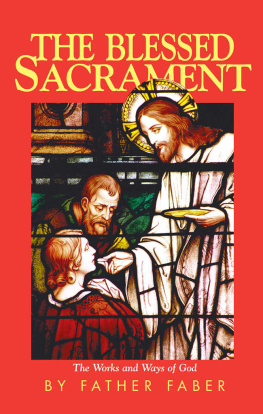
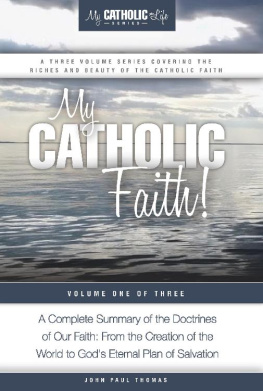

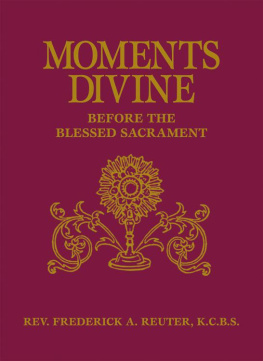
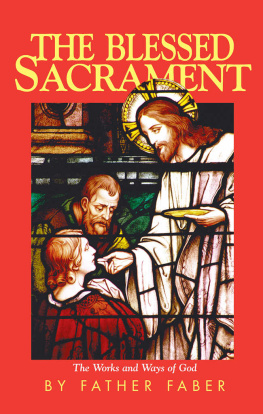
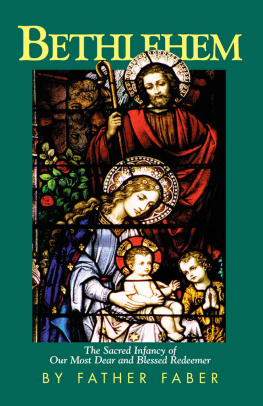
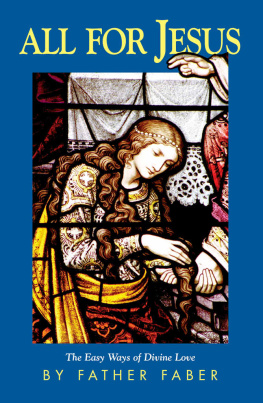
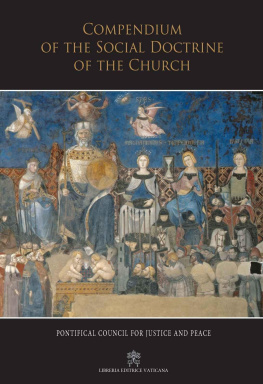
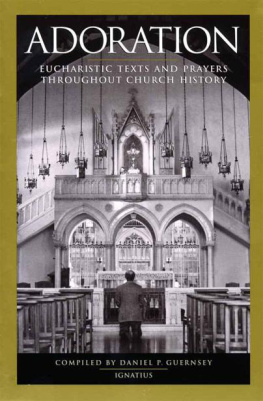
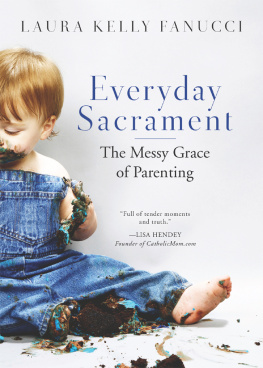


 J. F. O'HARA, C.S.C.
J. F. O'HARA, C.S.C.

 PLATO, Epinomis .
PLATO, Epinomis .